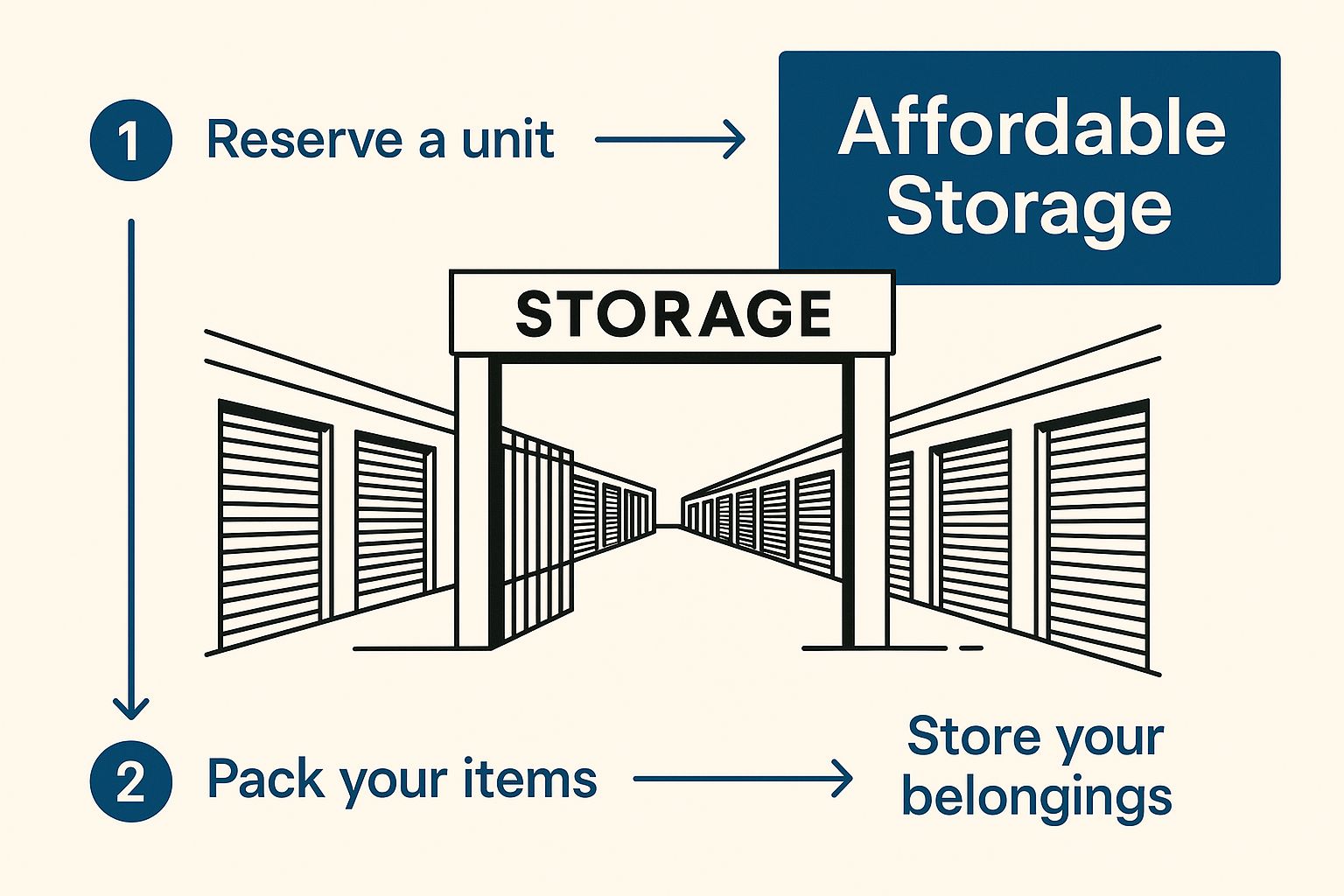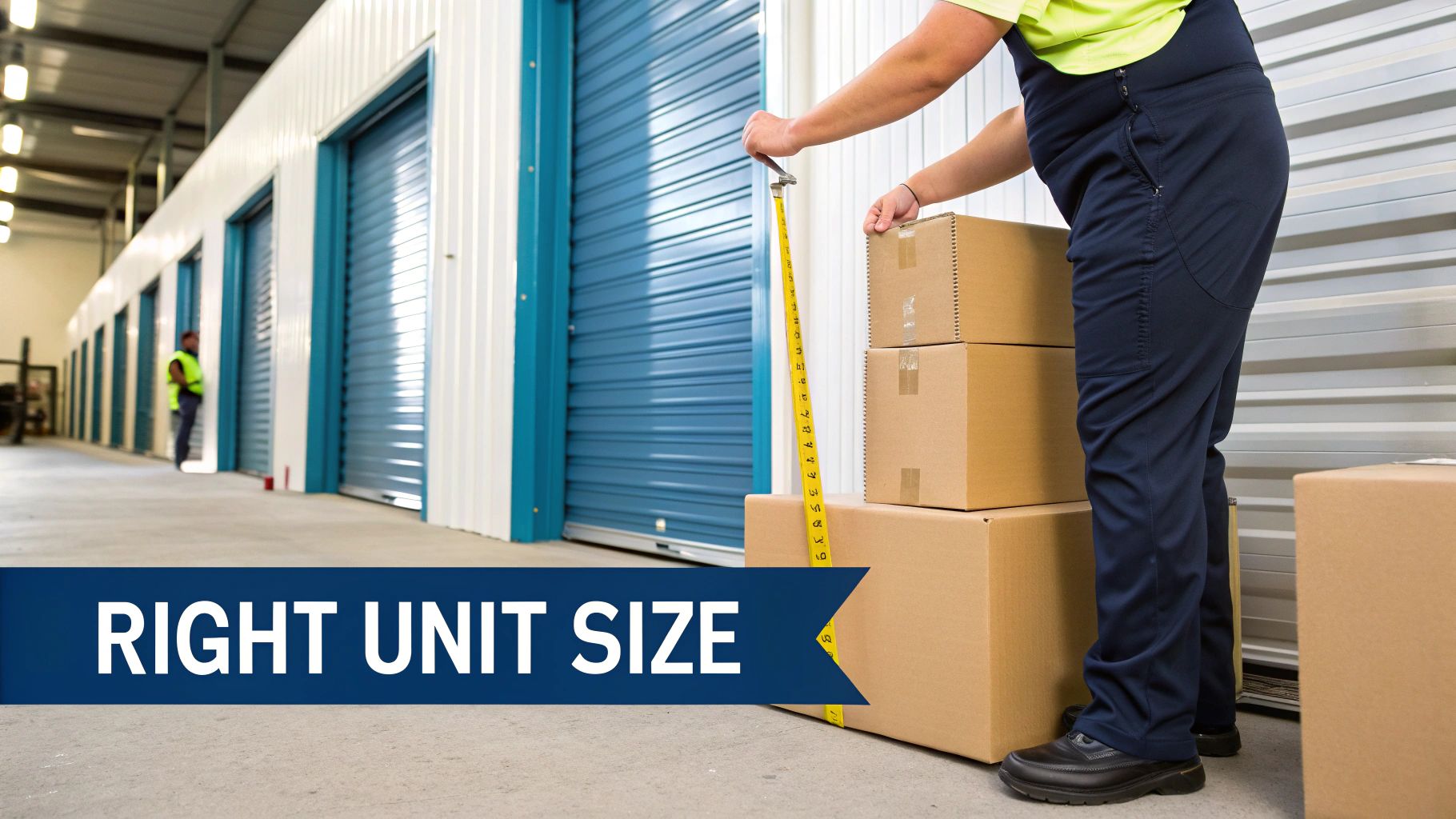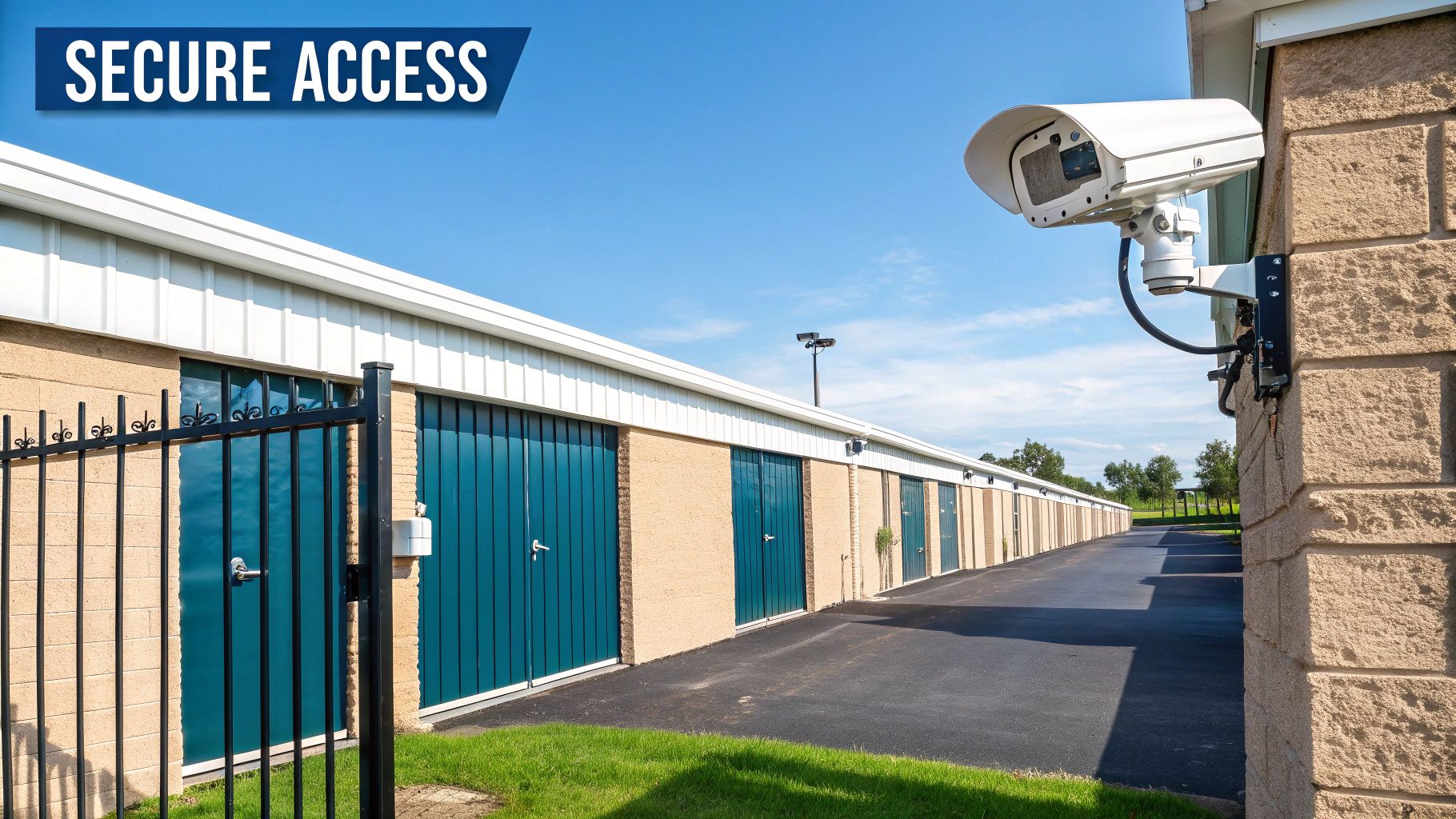Typing "cheap storage units near me" into a search engine can feel a bit like stepping into a minefield. You're bombarded with offers, but the real price is often buried under confusing terms, mandatory insurance, and one-off admin fees.
To find a genuinely good deal, you need to look past the headline price. A smart, focused strategy will help you sift through the noise and find the right storage solution without overpaying.
Finding Affordable Storage That Fits Your Needs
Let's be honest, navigating the UK self-storage market isn't always straightforward. The price you see advertised is usually just the starting point. The final bill can look quite different once you factor in the location, the type of unit you need, and any extra services.
The self-storage industry here is huge and still growing, with a turnover now around £1.2 billion across more than 2,900 sites. A big chunk of these—roughly 1,135—are container storage facilities. These are often a much more budget-friendly choice, especially if you're in a more rural area where land isn't as pricey. You can dig into the numbers on this container storage surge in recent reports.
This infographic gives you a quick visual rundown of the process from start to finish.

As you can see, it’s not just about a quick search. It involves properly assessing what you need before you even start comparing quotes.
Key Factors Influencing Storage Prices
To find a truly cheap unit, you have to get to grips with the variables that dictate the price. Not all storage is the same, and knowing the difference is key to making a smart decision.
- Location, Location, Location: It’s no surprise that a unit in a city centre will cost a lot more than one on the outskirts. If you don't need to pop in every other day, looking just a few miles out of town can save you a bundle.
- Unit Type: A simple outdoor container is always going to be cheaper than an indoor, climate-controlled unit. Be realistic—do your old garden tools really need protection from a bit of cold?
- The Hidden Costs: This is where many people get caught out. Always ask upfront about mandatory insurance, any "administration fees," and whether you have to buy their specific high-security lock. These extras can quickly add up.
I’ve seen it countless times: people rent a unit that’s far too big for their stuff. Accurately figuring out the space you actually need is the easiest way to avoid paying to store thin air.
How to Properly Compare Storage Unit Costs
When you're hunting for a storage unit, it's easy to get drawn in by a low monthly price tag. But I’ve learned from experience that the advertised rate is rarely the full story. To find the real best deal, you need to dig a little deeper into the total cost over the time you'll actually be using the unit.
Online comparison sites are a decent place to start, but they often miss the hidden deals and the sneaky extra costs. My best advice? Pick up the phone. A quick chat with the facility manager can uncover promotions that never make it online, like special rates for students, members of the armed forces, or discounts for paying a few months in advance. You'd be surprised what you can save just by asking.
Uncovering the True Price
Once you’re on the phone with a manager, it pays to be prepared. Having a list of specific questions ready will help you cut through the sales pitch and compare different facilities like for like.
Here's what I always ask:
- Price-Lock Guarantees: Is that great introductory rate locked in, and for how long? I’ve seen facilities bump up the rent after just 3-6 months, so you need to know what you’re signing up for.
- Mandatory Insurance: Do I have to buy your insurance? Find out the cost and then check it against third-party providers. You can often find a much cheaper policy elsewhere that still meets their requirements.
- Notice Periods: What’s the notice period for moving out? A lengthy 30-day notice can catch you out financially if your plans suddenly change.
- Additional Fees: Are there any one-off admin fees? What about a compulsory high-security lock I have to buy from you? These little extras add up.
The trick is to calculate your total outlay for a set period, say six months. Add up the rent, insurance, and any one-off fees. This gives you a much clearer picture than just comparing the initial monthly price, which can often be a bit of a smokescreen.
Don't forget to check out recent, genuine customer reviews. Past renters are usually brutally honest about things like sudden price hikes, dodgy security, or unhelpful staff – all crucial parts of the value you're getting.
Finally, remember that timing is everything. Just like with moving house, storage prices can fluctuate depending on the season. Learning about the best time of year to move can give you an edge in finding lower rates and better availability.
True Cost Comparison for Storage Facilities
To make this easier, I use a simple checklist to compare the complete, all-in costs from different facilities. It helps me look past the headline price and see the real numbers side-by-side.
| Cost Factor | Facility A (£) | Facility B (£) | Facility C (£) |
|---|---|---|---|
| Monthly Rent | |||
| Introductory Offer | |||
| Admin/Set-up Fee | |||
| Mandatory Lock Cost | |||
| Monthly Insurance | |||
| Six-Month Total |
By filling this out for each place you're considering, you'll immediately see which one offers the genuine best value, not just the most tempting initial offer.
Choosing the Right Unit Size and Type

One of the easiest ways to waste money on self-storage is by renting a unit that's way too big. It's a common mistake. You end up paying to store empty air, which defeats the whole purpose of finding a budget-friendly solution.
Getting the size right is crucial. But let's be honest, picturing how all your stuff will fit into a square space is tricky. A good rule of thumb is to think about it in terms of room sizes. For instance, a small 25 sq ft unit is often just right for the contents of a studio flat – think a double bed, a small sofa, and a stack of boxes. If you're still unsure, this detailed guide on https://admiralsyard.co.uk/how-much-storage-space-do-i-need/ can help you visualise the space better.
Standard vs Climate-Controlled Units
Once you've nailed down the size, the next big decision is the type of unit. This choice directly impacts your monthly cost, usually boiling down to a standard unit versus a climate-controlled one.
Your standard, no-frills unit is perfect for tough, resilient items. We're talking about garden furniture, tools, bikes, or well-sealed boxes of clothes. If your belongings aren't fussy about temperature swings or a bit of humidity, this is your cheapest and best option.
However, for anything delicate or valuable, you really need to consider climate control. It costs more, but it’s a small price to pay to avoid irreversible damage.
- Wooden Furniture: Prevents the wood from warping, cracking, or splitting when temperatures fluctuate.
- Electronics: Protects sensitive gadgets and their internal parts from moisture damage.
- Documents & Photos: Stops paper from turning brittle and keeps dampness from ruining precious memories.
- Antiques & Artwork: Maintains a stable environment, which is essential for preserving their value and condition.
Ultimately, paying a bit extra for climate control now could save you a fortune in replacement or repair costs later on.
Expert Tip: Be honest about what you're storing. There's no point paying a premium for climate control if all you have is a lawnmower and some old textbooks. Matching the unit's features to your items is fundamental to keeping costs down.
The UK storage market is fiercely competitive, with facilities often reporting occupancy rates above 90%. This high demand gives providers a lot of control over pricing. For those with unique needs, like storing a campervan, standard units won't cut it, and exploring options like a dedicated metal building for RV storage might be a more practical long-term solution.
How to Find Hidden Discounts and Special Offers
The price you see slapped on a website for a storage unit is rarely the final word. If you're serious about finding a genuinely cheap deal, you need to dig a little deeper than the headline price. Think of it less as a fixed cost and more as a starting point for a conversation. You'd be surprised how flexible many facilities can be, especially if they think they're winning a long-term customer.
One of the most common deals you'll come across is the classic 'first month for £1' offer. It's a great hook, but you need to do the maths. A rock-bottom introductory price can sometimes mask a much higher standard rate that kicks in from month two. Over a six-month rental, that "deal" could easily cost you more than a unit with a slightly higher but consistent monthly fee. Always, always ask what the price will be after the promotion ends.
Uncovering Less Obvious Savings
Once you look past the big, flashy introductory offers, you can often find even better value. The key is to be proactive and simply ask the facility manager what you might qualify for. A lot of the best discounts aren't advertised on the front page of their website.
It's always worth enquiring about these potential savings:
- Pre-payment Discounts: Are you planning to pay for a few months upfront? Many places will knock a decent percentage off your total bill if you pay for three, six, or even twelve months in one go.
- Long-Term Rates: If you know from the outset that you'll need the unit for a year or more, don't just accept the standard monthly rate. Ask if they have a specific, lower tariff for long-term commitments.
- Affiliation Discounts: You might be eligible for a discount without even realising it. Special pricing is often available for students, NHS staff, or members of the armed forces, so have your ID handy and ask if they offer it.
Don't be afraid to negotiate, either. A simple, polite question like, "Is that the best price you can offer?" can work wonders. This is especially true during quieter business periods when facilities are more focused on filling their empty units.
A quick browse of the facility's website is also a smart move. Look for a promotions or offers page. For a real-world example of what to look out for, check out these Admiral's Yard special offers to see the kinds of deals that are often available.
Don't Let a Low Price Tag Fool You: Balancing Cost, Security, and Access

Everyone wants to find cheap storage, but it's crucial to understand that the cheapest option is almost never the best. Saving a few quid a month might seem like a win, but it quickly becomes a false economy if your valuables are damaged or stolen.
Think about it this way: a low price is worthless if the facility has shoddy security. Cutting corners here is a massive red flag, so you need to know what solid protection looks like before you sign any dotted lines.
What Real Security Looks Like
When you visit a potential facility, put on your inspector's hat. A well-run, professional operation will be proud to show off its security systems. If they're vague or dismissive, walk away.
Here are the absolute essentials you should never compromise on:
- Proper CCTV Coverage: I'm not just talking about a single camera in reception. You need to see them covering all entry points, corridors, and driveways for complete monitoring.
- Secure Gated Access: The site should be sealed off from the general public. Access should only be granted via a personal keypad code or a key fob.
- People on Site: Having staff present during office hours is a huge deterrent to would-be thieves. It also shows the facility is actively managed.
- Individually Alarmed Units: This isn't standard everywhere, but it's a fantastic extra layer of security that gives you direct protection for your own space.
Also, take a look around. A clean, well-maintained site is a great sign. It shows the company invests in its property, which usually means they invest in protecting their customers' belongings too.
A cheap unit becomes incredibly expensive the moment its contents are lost. The peace of mind that comes from knowing your things are safe is always worth paying a little extra for.
Is 24/7 Access Worth Paying For?
The access you need will also play a big part in the final cost. Budget facilities often have pretty restrictive opening hours. However, paying a bit more for 24/7 access can be a game-changer, especially for business owners who need to grab stock at odd hours or anyone working on a tight schedule.
This kind of flexibility means you can get to your unit on your terms, not just during the 9-to-5. You'll have to weigh the convenience against the slightly higher monthly fee to see if it makes sense for you.
Of course, keeping your items safe is only half the story. You also need a plan for the unexpected. It's a good idea to learn about the importance of having the right storage unit contents insurance to make sure you're fully covered.
The UK self-storage industry is booming, growing by 7.2% in the last year to a massive 64.3 million square feet. To keep up, roughly 68% of operators are now using AI for everything from smarter access control to better customer service, making facilities more secure and efficient. You can read more about these industry advancements on januseurope.com.
Questions We Always Get About Finding Cheap Storage
When you start looking for a bargain on a local storage unit, the same few questions pop up time and time again. Getting the right answers to these can be the difference between bagging a great deal and getting stung by costs you never saw coming. Let's break down what people usually ask.
Do I Really Have to Get Insurance?
In a word, yes. Just about every storage facility in the UK will insist that your belongings are insured. It’s a standard part of the contract. However, while they’ll be keen to sell you their own policy, you absolutely do not have to take it.
You can often find a better deal by looking at specialist third-party insurers who focus purely on self-storage. It’s also a smart move to check your home contents insurance policy; some providers will let you extend your cover to items kept off-site. The golden rule is to never assume you're covered – always read the small print in your rental agreement to see what their specific requirements are.
The main thing to remember is that you have options. The facility's insurance is easy, but spending a little time getting your own quote can seriously reduce your overall monthly cost.
What Hidden Fees Should I Watch Out For?
The monthly rent is just the starting point. A few other charges can sneak their way onto your bill if you're not careful. First, most places will charge a one-off administration fee right at the start, just for setting up your account.
You’ll also find that many facilities require you to buy one of their own high-security locks, adding another upfront cost. But perhaps the biggest thing to clarify is what happens to your rent after the initial introductory offer runs out. A fantastic price for the first three months can easily turn into a very expensive one. You should also ask about their late payment penalties and how much notice you need to give before moving out to avoid being charged extra. A good, honest provider will be upfront about all of this from day one.
Is it Really Cheaper to Store My Stuff Outside the City?
On the whole, yes. It makes sense when you think about it. Storage sites in suburban or rural spots have lower running costs – things like rent and business rates are cheaper – and these savings are usually passed on to you.
If you don't need to be popping in and out of your unit every day, looking just a few miles further afield can make a big difference to your monthly payment. Of course, you need to weigh this up against your own costs. Factor in your time and fuel expenses for the journey to make sure that a lower rental price genuinely works out as the more affordable option for you.
Ready to find a secure, affordable storage solution without the hidden surprises? At Admiral's Yard Self Storage, we believe in transparent pricing and top-tier security. Get your no-obligation quote today at https://admiralsyard.co.uk and discover the perfect space for your needs.

